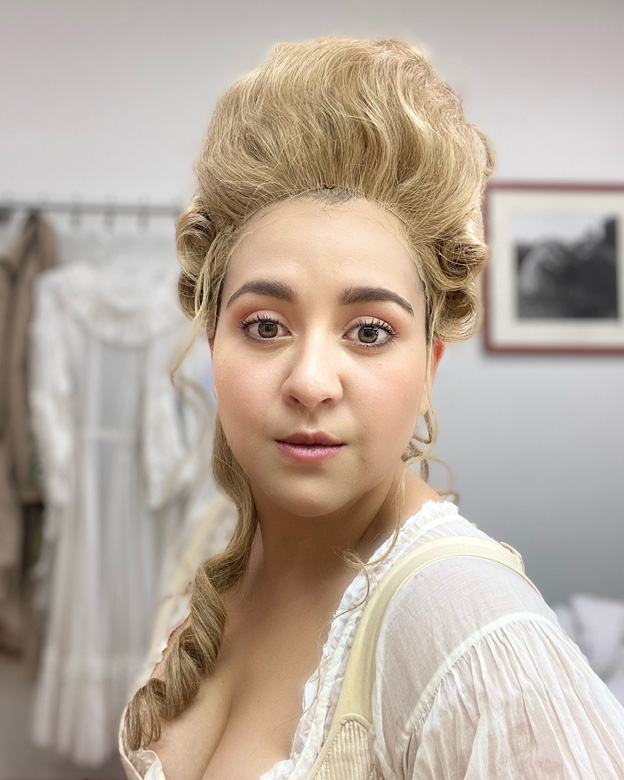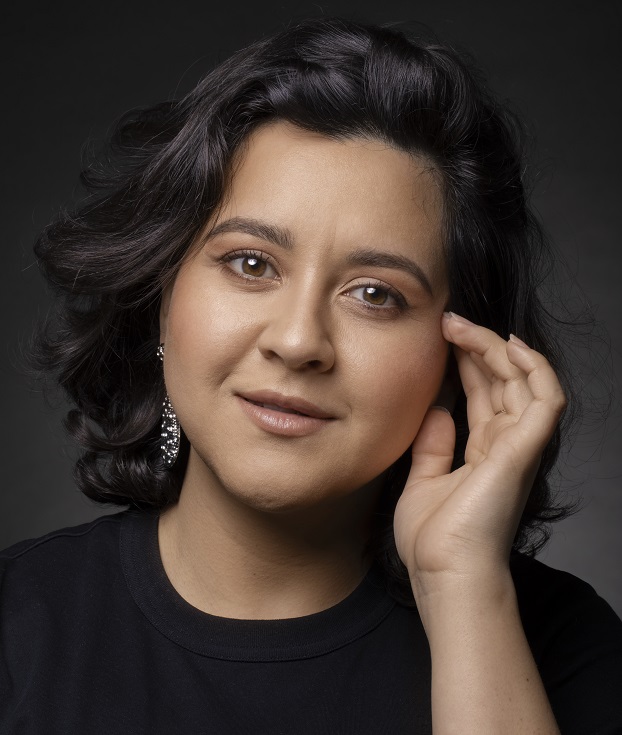You will make your house debut at the Grand Théâtre de Luxembourg as Contessa Almaviva in Mozart’s Le Nozze di Figaro on the 6th of October. How would you describe this character?
The character of Contessa is that of a young bride in the first years of her marriage that has lost, for some reason, the love and care of her husband. Inspite of that, we must not forget that it’s Rosina, a young lively girl that previously in Barbiere di Siviglia is more witty and fun than Figaro. She is a very dynamic character.
Do you have any favourite moments in this opera?
It is difficult to say…. One of the many favourite moments in the opera is possibly the terzetto with Count Almaviva and Susanna, ‘Susanna or via sortite’, because it’s a complete musical firework that presents Rosina with character and vocal agility that paints her Spanish fiery personality.
What’s so difficult about singing Mozart?
I guess it’s the instrumental quality of the vocal writing. Phrasing the melody is indispensable for good Mozart interpretation. He writes many indications for the orchestra, which can also be applied to the vocal line, and they make for a beautiful tool for finding colours and articulations in the singer’s melody. I always thought that Mozart is one of the ultimate tests for a singers technique, as it requires an absolute flexibility in the voice and a sense of declamation for delivering the text emphatically.
Since you were born in Guatemala, which is a country where opera is not widely known, what was your first encounter with opera?
I was three years old when my mother was watching opera on TV (this was in the 90’s), and I watched it with her. Apparently it was one of the only moments I would stay still as a child. But it wasn’t until my teenage years that I truly came to appreciate opera. I was 16 years old when I met my first singing teacher, Barbara Bickford. She said to me “no matter what you want to do, jazz, rock, pop, or opera, you have to learn the classical singing technique”. Then she gave me a box of scores and two albums: Bartoli’s and Hvorostovsky’s Arie Antique. I went home and listened to this music and it completely ran through me to hear how someone could bend sound that way. It was so expressive, intimate and detailed. I fell in love immediately and went back for my second lesson having learnt at least five Arie Antiche.
When did you know you wanted to be an opera singer?
As I continued my studies with Barbara Bickford I grew more interested with opera and got to know a lot of opera repertoire. In a very strange way, I wanted to be an opera singer before knowing what it was even about. As we don’t have a national opera company that works regularly, until I was 19 I had never seen a fully staged opera live. But I loved the repertoire so much and was so excited by the stories and singers, that it because a sort of obsession to get informed about it. The first opera I assisted to was a performance of Barbiere di Siviglia at the San José Opera in California in 2010.
How did Operalia change your life? Was Operalia your first competition?
Operalia definitely gave more visibility to my career and personally it gave me a lot of perspective about the profession. Operalia wasn’t my first competition. I had previously won the Francisco Viñas in Barcelona, the Otto Edelmann in Vienna and the Veronica Dunne in Ireland. Operalia is in a way the biggest competition in the opera world.
What do you like most about competitions?
Competitions are a wonderful tool for young singers. First of all, as a young singer you are meant to build your career from scratch and that means a lot of auditions. Auditions cost money: travel and lodging expenses, singing lessons and coaching sessions to prepare your repertoire, the audition dress and shoes, scores etc… If you participate in a competition, you will normally have a jury with people who could potentially employ you. That is the case with Operalia – in the jury you have the casting directors of London, Paris, Madrid, Chicago, Vienna, New York, etc. So instead of going to all these cities to audition, you sing for all of them at once.
Then there is the human aspect of competitions. First you learn that competitions are not about competing with others but actually about competing with yourself. You are meant to give your best, fighting your fears and overcoming obstacles. Once you realise this, competitions become a perfect environment to meet other young singers and to hear different voices. Coming from Guatemala, I loved hearing people from all over the world and hearing such different repertoire.
How would you define your voice?
I would say it’s a wild horse that has a mind of its own, haha… Technically, and by book definition, my voice is that of a lyric soprano which is capable of doing long, sustained legato phrases with a round velvet sound that is meant to go from a low G to a high Eb. Personally, I would define my voice as a vehicle of expression and as part of an instrument to serve music and dramatic intent. As a child I was not very outspoken and had a hard time finding words to express myself. It wasn’t until I started singing that I found a way to express how I felt and for people to understand what I wanted to say. So I would say my voice is the most sincere and open way to get to know me.
Your new recording will be released on the 15th of October with the label Audax Records, featuring Albeniz’s complete songs. You join again forces with Iñaki Encina Oyón after your album debut singing French mélodies by Robert Dussaut and Hélène Covatti. Tell us about this complete recording of the songs of Isaac Albéniz.
Audax Records is a label whose goal is to record unknown or forgotten repertoire, and their slogan is ‘Stay Curious’. Perfectly aligned with our artistic goals, our second album with Iñaki is the result of a continuous search for Spanish repertoire, which we are often asked to perform in recital. But instead of doing the same Granados, Obradors and de Falla, we searched a bit further to find Albéniz, who is mainly known for his piano compositions.
At first glance, you would think that he composed a lot of music in Spanish, but he only composed five songs in Spanish and the other 25 songs are in Italian, French and English. We like to think of his songs as a true musical biography of Albéniz given that they present his development as a composer quite clearly according to the different stages and encounters he had throughout his life. His Spanish songs were meant to be an accompaniment for recited poems by Bequer, so they are quite simple in the melodic line. Then as he travelled into Italy, his melodies become more influenced by the bel canto style. As he later travelled to France and encountered composers like Fauré, Chausson and D’Indy you clearly see his style evolve into the more modern late eighteenth century French style with many alterations and complex melodies. The cuspid of his life brings him to England where he meets Francis Burnett Money Coutts, who would become Albéniz’s main sponsor and dear friend. As Money-Coutts was also a writer, apart from an heir to a big banking family, he wrote poems for Albéniz’s songs for which he composed fifteen. The first of the English cycles is dedicated to Money-Coutts’ wife, Nellie, and the last cycle “Four Songs” is dedicated to his dear friend Gabriel Fauré.
Albéniz’s songs are not widely known because it wasn’t until 20 years ago that we had the first edited score of his songs, and the fact that they are mainly in English are two main reasons why we think they have not gained much popularity. We hope that this album will make people curious of discovering this side of Albéniz and shed light on his melodic genius.
When did you first meet Iñaki Encina Oyón? What is like working with Iñaki? Is he a kind of mentor for you?
I first met Iñaki in 2012 during a tour with the World Youth Choir where he was the assistant conductor for the project. It is actually because of him and his interest in my voice that I am in Europe at all. When I first auditioned for the choir he was very supportive in informing me of the options for young opera singers and how to develop a career. Soon after he invited me to Paris to work with him and subsequently presented me to Christian Schirm who invited me to be part of the opera studio at the Paris National Opera and from then on Iñaki has always remained a mentor and dear friend.
Working with Iñaki is intense. He is always very well informed and prepared for the pieces we are rehearsing. His knowledge of languages, literature, history, music and his detailed analysis of the repertoire is truly inspiring and is a motor of our musical partnership. But his main strength is the care he puts to always get the best result of the people and the music he is working with. His human quality is excellent.
You got a great success with your debut as Mimì in Puccini’s La Bohème at the Liceu in Barcelona. Which other roles are you planning to add to your operatic repertoire?
The big upcoming debut I have will be at Houston Grand Opera in the title role of Gounod’s Roméo et Juliette. It will be the first time I sing in the US. Then my season is filled with Mozart’s Contessa Almaviva and Puccini’s Mimì, but I will also venture into the concert repertoire singing my first Mahler 4th Symphony and Verdi’s Requiem in Parma and Lisbon respectively.
Some roles that I plan to add to my repertoire are Amelia and Desdemona in Verdi’s Simon Boccanegra and Otello. I would like to slowly venture into Verdi but I am quite happy to revisit roles like Micaëla, Liù, Contessa and Mimì which I have already sung and will keep singing in upcoming seasons. Callas used to say: « You don’t know a role until you have sung it at least 30 times…. » So I guess that’s what I’ll do with my roles for a while.
Tell us about your upcoming projects
Currently I am making my house debut in Luxembourg, which I find fabulously charming. After Le Nozze di Figaro performances I will head back to France for recitals with Iñaki in Lille and Dijon where we will perform songs of both our first and second albums. In December I will go to Hungary for a recording of Herculanum by Félicien David. Then in January back to France to sing Mimì in La Bohème at the Opera de Toulon. From there my season takes me to Italy, for Mahler’s 4th Symphony. Juliette in Houston is shortly after in April to early May and a few weeks later I’ll sing Verdi’s Requiem with conductor Lorenzo Viotti in Lisbon.
Concerning my recording projects with Audax Records, we have already started working on the next album which will be focused on the Italian prima donna Adriana Ferrarese. It will be our first project with orchestra and Iñaki will conduct.


























